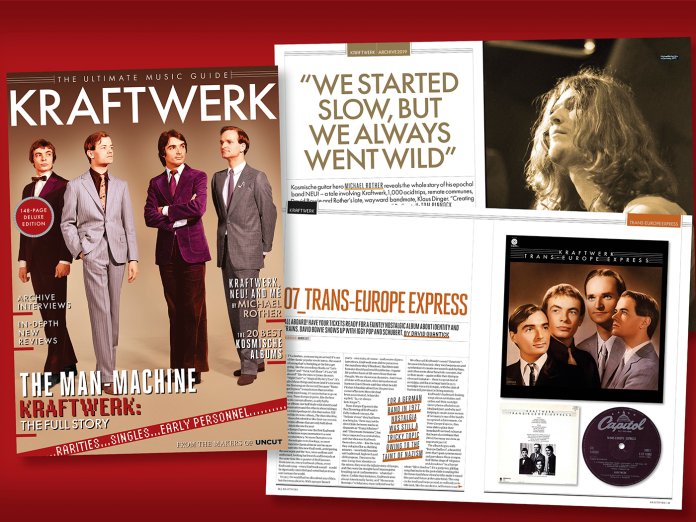BUY THE KRAFTWERK DELUXE ULTIMATE MUSIC GUIDE HERE
If there was a recent occasion to capture some of Kraftwerk’s unique standing it was surely their run of 3-D Catalogue shows in 2013.
There we stood, on the sloping floor of the Tate Modern turbine hall, delighting in the band’s music – it was the placid, ominous Radio-Activity the night I went – but also in the band’s many quirks and contradictions. It was an evening of past and present; high and popular art.
We could witness Kraftwerk’s dedication to technology (their engrossing visuals) but also smile at the kitsch retro-futurism which permitted it (the cardboard 3D glasses, unchanged since the 1950s). We could hear the songs we knew; but now with optimal updates installed. Most obviously, while the band remained utterly serene and remote, the music and the experience conspired to connect and enfold us all.
That night, and throughout that week, Kraftwerk revisited their official canon, as they presented it in their 2009 box set Der Katalog, an eight-album run of highly-polished, high-concept work beginning with 1974’s Autobahn. In this magazine, you’ll find in-depth reviews of those albums, and a wealth of contemporary encounters with the band, drawn from the archives of NME, Melody Maker and Uncut.
Everything outside of these self-imposed restrictions, Ralf Hutter has pronounced, is “archaeology”. But every machine has a prototype – and Kraftwerk are no different. As such, this publication isn’t only a celebration of Kraftwerk’s 50 years of creativity, it also gets into the circuitry of their story. Here you’ll be able to discover more about the period outside Kraftwerk’s canon: the two “cone” albums, Ralf And Florian, and even the album by Organisation, the experimental Dusseldorf band which featured a young Ralf Hutter and Florian Schneider.
As you’ll read in the early pages here, and in our reminiscence from Florian and Ralf’s early collaborator Eberhard Kranemann, anyone who imagines Kraftwerk to have always been about clean lines, control and laboratory conditions will be in for a surprise: the dawn of Kraftwerk was a rather more random place. Still, somewhere amid the naked swimming, the auto-destructive art, guitars and cross-legged hippies, however, a scientific breakthrough was made.
Working thereafter in their Kling Klang studio, Ralf and Florian created a hermetic unit (“like a married couple,” Kranemann notes), dedicated to their music and to a – highly European – vision of interconnectivity and its implications. While some writers welcomed the new music – initially as another turn on prog’s winding track – and responded to Kraftwerk for their advances in aesthetics, music and humour, there was in some quarters a suspicion manifesting itself in an exaggerated, yobbish ignorance. If there was a coherent complaint to be discerned in the latter position, it was usually that Kraftwerk’s music was “cold” and lacking “humanity”.
Which is a little ironic. Because as much as it is about technology, it’s worth remembering that Kraftwerk’s music is about technology’s consequences for human beings. That could mean weighing data-gathering against individual freedom, or pondering social connection via remote computers. On a practical level, even into middle age, the band were interested in the effects electronic music had on actual people – taking regular trips into the world’s evolving clublands to take the temperature of the room.
In recent years, co-incident with their old/new release The Mix, in which the band reworked some of their best-known songs for a younger – or at least more club music familiar – audience, Kraftwerk has predominantly been a performing rather than a recording unit.
Since this magazine was last published, we have mourned the passing of Kraftwerk founder member Florian Schneider-Esleben, emerged from the pandemic which interrupted the band’s 50th anniversary celebrations, and now can continue to enjoy their legacy as they continue a European tour. Europe Endless – and also timeless.
Get your copy in stores now, or here with free UK P&P.



